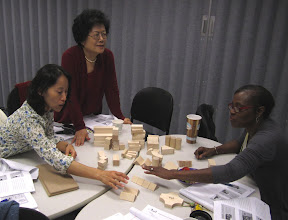How will you implement your professional development learning this year?
By Peggy Ashbrook
Posted on 2011-09-07

Professional development strengthens teaching skills and introduces the latest research about learning.
For early childhood teachers professional development can range from first aid to interactive reading to integrating science inquiry with literacy and mathematics learning. We hope we never have to use the first aid training but everything else is a boost to our teaching. This summer I got to participate in a training on science inquiry held at the University of Northern Iowa Regents’ Center. The development of this work by their Center for Early Education in Science, Technology, Engineering and Mathematics (CEESTEM) is supported by the National Science Foundation and by the National Aeronautics and Space Administration (NASA). Research in early childhood education supports the practice of teachers engaging in science inquiry in preparation for teaching science to their students.
One very important tip (no, not the “one weird tip that really works” as so many web ads claim) that I learned was to make time for children to get deeply into the process of asking questions as they explore phenomena through direct exploration. Researchers found that when there are too many transitions, it interrupts children’s investigations and problem solving.
This is tough to do if I set aside time “just for science” so I’m going to focus on integrating science inquiry with opportunities for early literacy and mathematics learning. After working with tools to move water with pushes and pulls, children used a tally chart to document which tool they liked the best.
Tell us about the professional development pointers you will be using this year in a comment below.
Peggy
Disclaimer: The views expressed in this blog post are those of the author(s) and do not necessarily reflect the official position of the National Science Teaching Association (NSTA).



